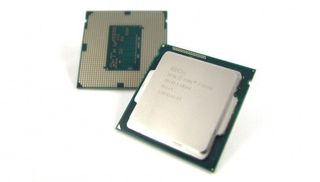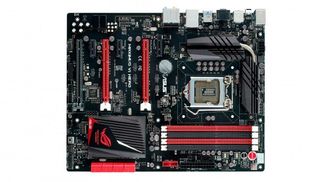Asus unlocks overclocking on lower-end Haswell motherboards

Asus seem to be losing ground to their motherboard rivals, Intel at the moment, but they've sniped back at Intel's imposed restrictions on CPU overclocking. If you have any Asus 8-series mobo for the Haswell/4th Gen Core you can now upgrade the BIOS to allow full access to the overclocking features of Intel's K-series processors.
These features were previously only accessible via the top-end Z87 chipset, but this was more of a marketing differentiation than a physical restriction. The unlocked CPU multipliers of the K-series Haswell CPUs - the i7-4770K and i5-4670K - can now be tweaked with abandon on all Asus' H87 and B85-based boards as well as the Z87 mobos.
Gigabyte have taken a huge amount of the Haswell motherboard market share - at least if you look at the boards PC builders out there are using - Asus have had to do something to differentiate theirs and offer a little more to their customers. The benefit of this is that you can now pair your expensive K-series CPU with a cheapo motherboard and still have access to the overclocking features in your premium-priced processor.

The difficulty is that the H87 and B85 boards are still not designed with overclocking in mind and therefore wont necessarily be able to deliver the same levels of OC performance you can get with the more expensive Z87 motherboards. I would expect this to be a little concerning for Intel. So I dropped them a line to get their stance on Asus' latest move. Intel's response:
“ Overclocking is considered a performance feature and is targeted for the most feature-rich platforms that are designed for the rigorous stresses to which overclocking platforms are exposed .”
“ As such, Intel planned to support processor core multipliers in addition to memory, voltage, and graphics overclocking on Intel Z87 based platforms only when paired with an Intel Core i7-4770K or i5-4670K processor. Given most H87 and B85 based platforms are not designed to be overclocked and may not have sufficient margin to provide a stable overclocking experience, customers will not experience the same level of overclocking performance on non-Z SKU platforms. ”
So, while the lower-end H87 and B85 boards might be able to boot at the same general clockspeeds as their Z87 compadres, they may not have the ability to keep rocking those GHz for the same length of time.
The biggest gaming news, reviews and hardware deals
Keep up to date with the most important stories and the best deals, as picked by the PC Gamer team.
But suddenly I'm interested to see what the H87 and B85 boards can do. Time to hit the labs, methinks.

Dave has been gaming since the days of Zaxxon and Lady Bug on the Colecovision, and code books for the Commodore Vic 20 (Death Race 2000!). He built his first gaming PC at the tender age of 16, and finally finished bug-fixing the Cyrix-based system around a year later. When he dropped it out of the window. He first started writing for Official PlayStation Magazine and Xbox World many decades ago, then moved onto PC Format full-time, then PC Gamer, TechRadar, and T3 among others. Now he's back, writing about the nightmarish graphics card market, CPUs with more cores than sense, gaming laptops hotter than the sun, and SSDs more capacious than a Cybertruck.
Most Popular

